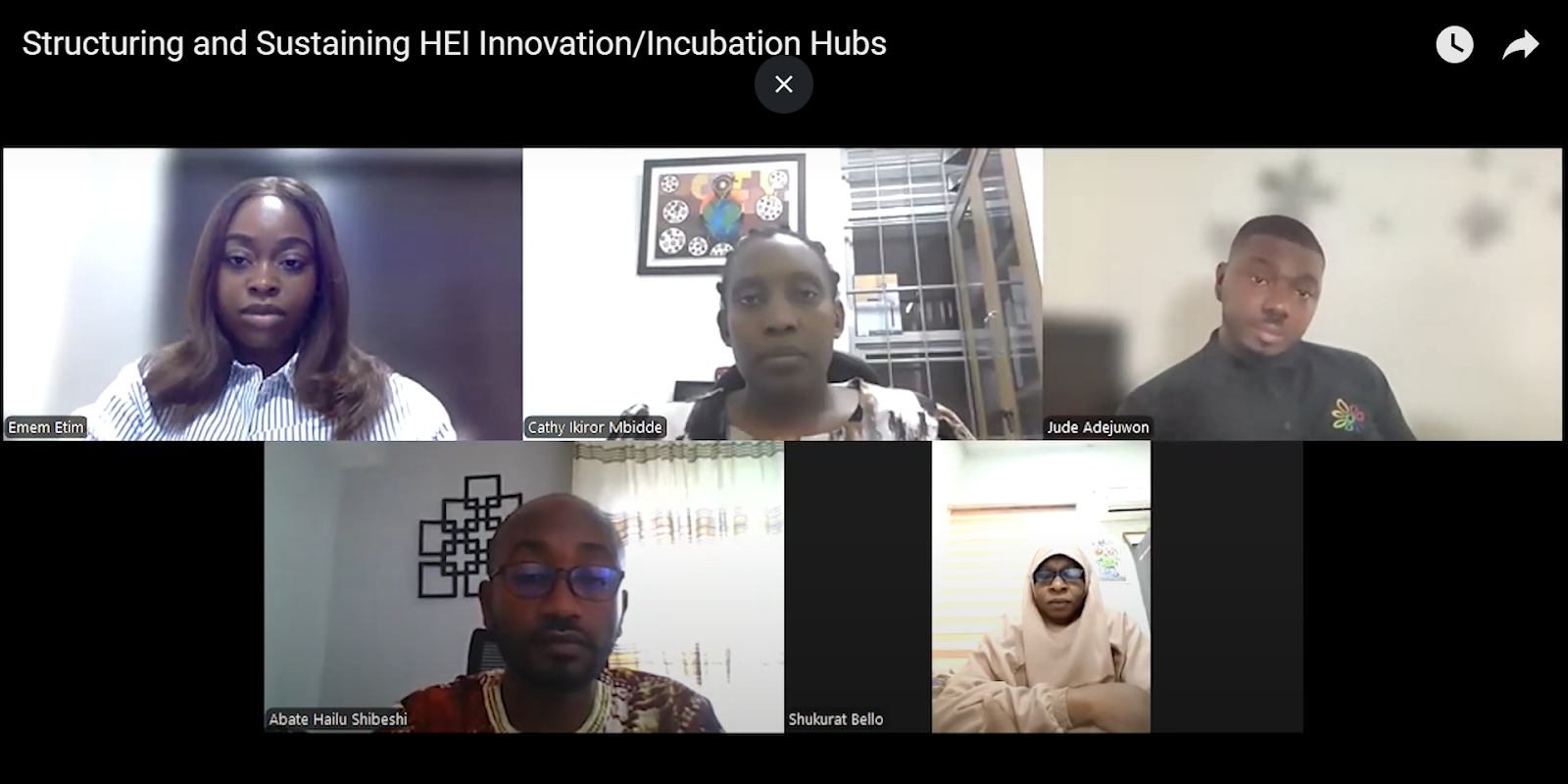On Wednesday, July 9, 2025, the EyeCity Africa Higher Education Institution Innovation Practice hosted a dynamic and insightful webinar series aimed at unpacking the structure and sustainability of innovation and incubation hubs within the African Higher Education Institutions (HEIs). This engaging knowledge-sharing session brought together over 130 participants from over 30 countries, including innovation thought leaders, industry experts, research centers, entrepreneurship support organizations (ESOs), and academics.
The goal of the session was to foster a deeper understanding of the challenges and opportunities surrounding the sustainability of tertiary institution-based innovation hubs and their impact on research-to-commercialisation outcomes.
The webinar was moderated by Emem Etim, the Associate Project Manager at EyeCity Africa. She was joined by Jude Adejuwon, Lead, CcHUB Namibia & Higher Education Institution Innovation Practice; Dr. Shukurat (M.) Bello, Ph.D, AAT, CIFE, CSAA, Manager, Innovation Hub, Bayero University Kano; Abate Hailu, Lecturer and Business Incubation Advisor, Hawassa University; and Dr. Cathy Ikiror Mbidde, Manager, Makerere University Innovation Pod.

Dr. Cathy Ikiror Mbidde opened the session with compelling remarks on the critical role of innovation hubs within Higher Education Institutions (HEIs). She highlighted how innovation hubs serve as engines for translating academic research into market-ready solutions, thus advancing research-to-commercialisation efforts across the continent.
She also shared insights into the Makerere University Innovation Pod (UniPod), an initiative supported by UNDP, which has become a model for university-led innovation ecosystems. The UniPod focuses on fostering entrepreneurship, supporting student-led innovations, and building strategic partnerships that bridge academia, industry, and government.
Jude Adejuwon followed by offering a Pan-African perspective on how Higher Education Institutions can sustain innovation hubs beyond the lifespan of external partnerships. He emphasised the importance of institutional ownership, the development of diversified and sustainable funding models, and the alignment of innovation hubs with broader national and regional development priorities.
A crucial point Jude highlighted is the need for HEIs to become entrepreneurial themselves, not only supporting innovation from students and faculty but also adopting entrepreneurial thinking in how they manage resources, forge partnerships, and scale initiatives.
Dr. Shukurat Bello also underscored the importance of building the relevant infrastructure required for innovation to thrive within Higher Education Institutions. She emphasised that beyond funding and policy, innovation hubs need reliable internet connectivity, skilled human resources, dedicated physical spaces, and supportive institutional frameworks. These foundational elements, she noted, are essential to foster a vibrant environment where creativity, experimentation, and collaboration can flourish.
Abate Hailu emphasised the importance of developing business models uniquely tailored to Higher Education Institutions, enabling them to sustain their innovation hubs and secure resources over the long term. He highlighted that HEIs cannot simply adopt commercial models; HEIs need context-specific approaches that align with their academic mission while allowing flexibility for growth, partnerships, and impact-driven outcomes. Additionally, he stressed that the clear definition and tracking of relevant metrics, such as innovation outputs, commercialisation rates, and stakeholder engagement, would help institutions monitor progress, justify funding, and continuously refine their approach.
Following the panel discussion, the webinar featured a robust Q&A session, providing participants with the opportunity to engage directly with the panelists. Attendees raised thoughtful questions around institutional sustainability, funding strategies, cross-sector collaboration, and how to build innovation cultures within traditional academic environments.
In conclusion, the webinar highlighted the urgent need to structure and sustain innovation and incubation hubs within Higher Education Institutions (HEIs) across Africa.
The HEI Innovation Practice by EyeCity Africa remains dedicated to connecting visionary minds with the resources they need to thrive. Did you miss the live session and want to catch up on it? Access the recording of the webinar here: English and French.
Be sure to check out our upcoming webinars and programs for more opportunities to learn, and you can join our community to network and connect with other stakeholders.
For more information on future webinars, opportunities, or partnerships, please contact us at heipractice@eyecity.africa
Learn more about HEI Innovation Practice by EyeCity Africa here.